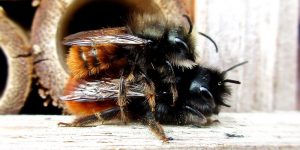Fungicide Found to Jeopardize Male Pollinator’s Ability to Find a Mate, as EPA Ignores Risk
(Beyond Pesticides, May 3, 2022) Exposure to a commonly used fungicide considered to be ‘slightly toxic or nontoxic’ to pollinators makes male mason bees less likely to find a mate, jeopardizing future generations of critically important pollinators. This determination comes from research recently published in the Journal of Applied Ecology by scientists at Germany’s University of Würzburg. The timing of these findings comes after the U.S. Environmental Protection Agency (EPA) reapproved uses of fenbuconazole, the fungicide in question, late last year without completing all required studies on pollinator health effects. Horned mason bees (Osmia cornuta), a solitary bee species, have a complex mating process that includes a range of “pre-copulatory behaviors” used by male bees attract females. Males create thoracic vibrations with their flight muscles, rub the eyes of female bees with their antennae, and emit a distinct odor from their body. If the female likes the presentation, she will mate with the male. Otherwise, she will move him to the side and wait for another male to try to win her affection. To see how this process was influenced by pesticide exposure, researchers conducted a range of different experiments. For the first, newly emerged male and female bees were … Continue reading Fungicide Found to Jeopardize Male Pollinator’s Ability to Find a Mate, as EPA Ignores Risk
